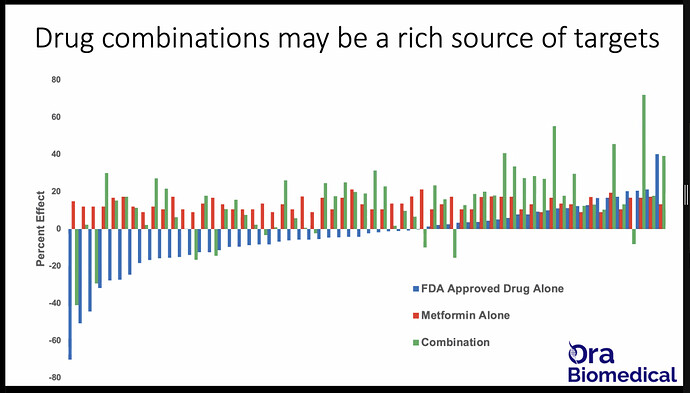In a fascinating video posted by RapAdmin on gemfibrozil, dr Brian Kennedy says that when you are taking one antiaging supplement, you are at the edge. When you take two, you are the off the edge. You have no idea what is happening. He brings it up 22 minutes into this video, preset to start then.
At a conference in August Brian Kennedy gave further details. He said that when more than one supplement is given to mice the most common result is that the supp with the weakest effect is nullified. The effect of the strongest supp stays the same.
Scary is the second most common result which is that the effects of the supps cancel each other out.
The third most common, and rarest, result is that the effects are additive. I had assumed this was the most common result and if he is correct my supplement world is turned upside down.
I hope somebody on the thread can convince me this is not correct, or give another perspective!
Brian Kennedy told me there is nothing published on this and it is all on mice.
He also told me that he believes all this is true even if different pathways are used to reach the same target. He seemed to agree that if supps don´t share the same target, the risk should be less or nullified. But this may be of scant consolation since the more I look the more everything seems to be related:
Our talk departed from the mTOR signalling pathway and my use of Ca AKG, an mTOR inhibitor. As I research my supp stack, I realize that “All roads lead to mTOR”. In the crosstalk between signalling pathways, almost all my supps interact with the mTOR pathway: Besides AKG, they are taurine, curcumin, CoQ10, quercetin, carnosine, zinc, melatonin, tadalafil and reishi, They all inhibit mTOR except one that mainly activates mTOR.
With rapamycin on hold for me, Ca AKG is my current no 1 longevity supp, that I will be using for seven months as per the average in that trial, before retesting my AKG level. Should I really stop all others, taking them one by one sequentially, perhaps two a year? Or could the fact that the supplements also have other targets than mTOR mean that these are unaffected by (negative) interaction between supplements? Could the fact that my AKG level is so low mean that supplementing it will somehow avoid interaction risks with other mTOR inhibitors?
I have no idea. I would love a long talk with Brian Kennedy or some other person with deep knowledge, about each of the supps. Having grabbed him three times at the conference for snippets of talk between others wanting his attention, I balk at reaching out again.
For the time being, I am only taking the three supplements that are the dearest to me.
To help me arrive at a conclusion, I have put in writing the connection of each one to mTOR. This in the hope that the connection would prove to be weak but the more I look the stronger I find the connection to be in most of them. If wanted I can post them.

